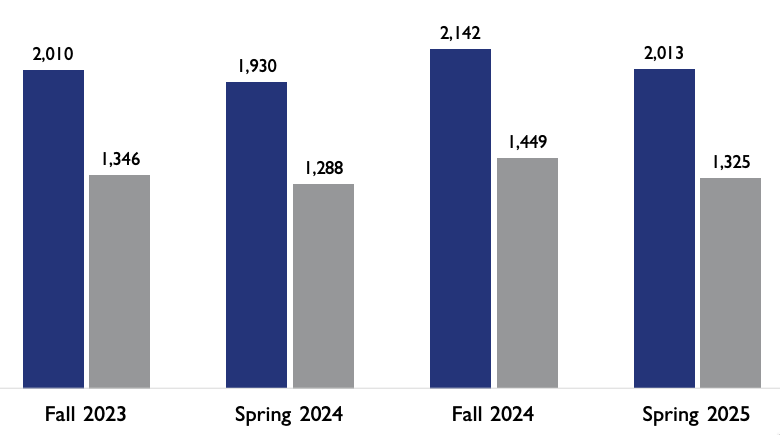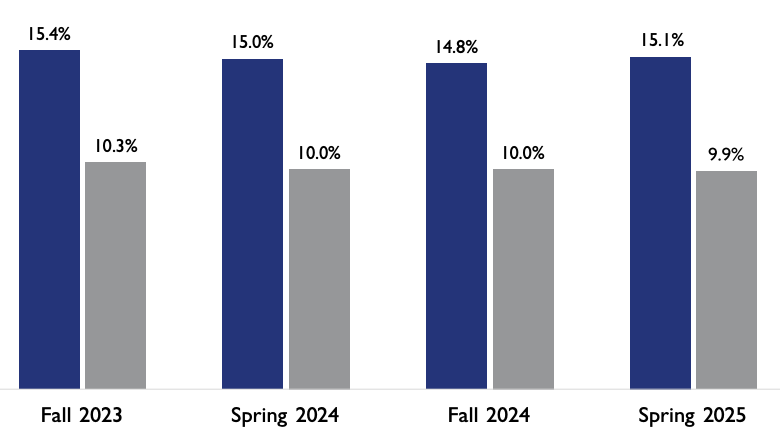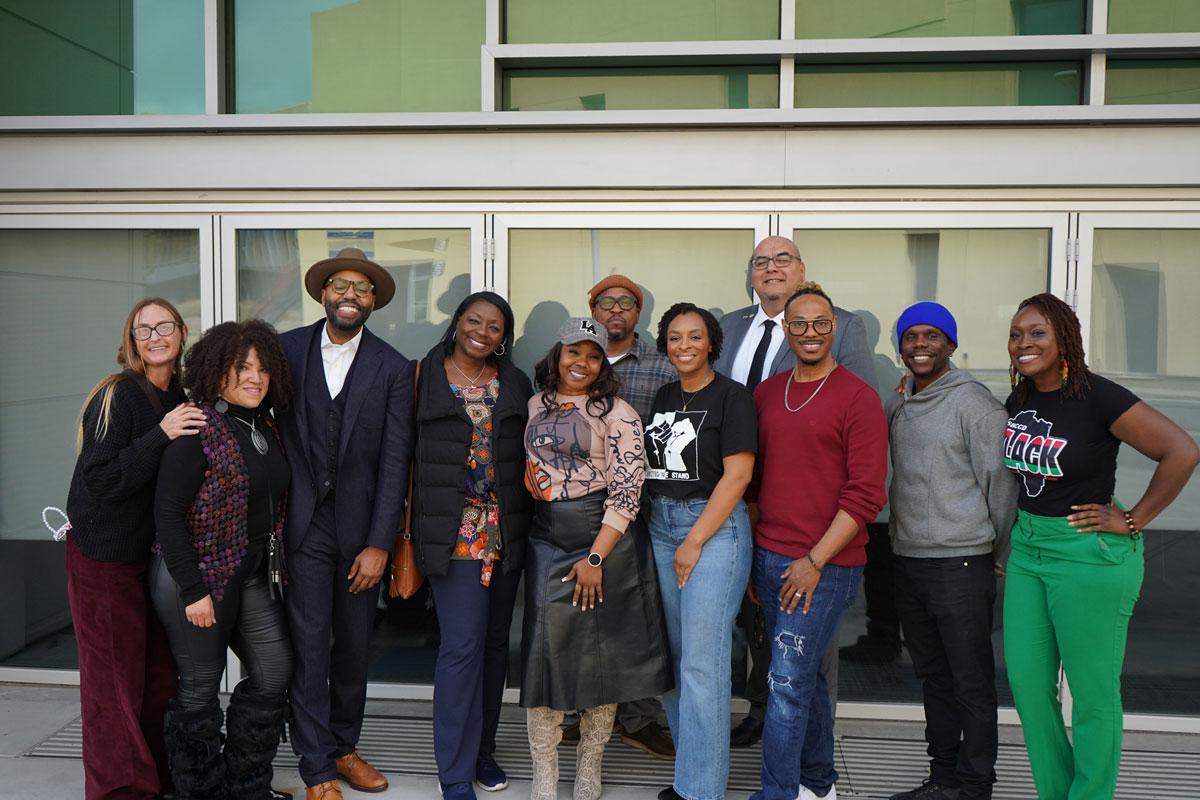SBVC’s Path to Becoming a Black Serving Institution (BSI)
Empowering Black Student Success at SBVC
San Bernardino Valley College is proud to take its first steps toward becoming a designated Black Serving Institution, committed to fostering academic excellence, equity, and community empowerment for Black students.
About the California Black-Serving Institution (BSI) Designation
The designation of California Black-Serving Institution was established to recognize
colleges and universities that excel at providing academic resources to Black and
African American students enrolled in degree or certificate programs offered by colleges
and universities.
The California State University system defines BSI eligibility based on:
- Has at least 10 percent of the college’s or university’s enrolled student population identifying as Black and or African American students or has at least 1,500 Black and or African American students enrolled at the college or university.
- Submits an initial or renewal application, as applicable, to the Statewide Central Office for the Advancement of Black Student Success on or before the application deadline
Learn more about the BSI designation from the California State University Central Office for the Advancement of Black Student Success.
Senate Bill 1348 (SB 1348), also known as the California Black‑Serving Institutions Program Act of 2024, was signed into law on September 26, 2024, and went into effect on January 1, 2025 Diverse: Issues In Higher Education+12Digital Democracy | CalMatters+12ahed.assembly.ca.gov+12. This groundbreaking law establishes a formal BSI designation to recognize colleges and universities that excel at providing academic resources and support to Black and African American students.
This official designation highlights an institution’s commitment to student success. Once awarded, the BSI designation is valid for five academic years, after which institutions may apply for renewal.
SBVC's Commitment
SBVC is proud to serve one of the most diverse student populations in California. In May 2025, SBVC held its first-ever BSI Convening, gathering more than 50 faculty, staff, administrators, and students to begin identifying the college’s current efforts - and future strategies - to support Black student success.
Following this convening, SBVC has proudly applied for the California Black-Serving Institution designation under SB 1348. By becoming a Black Serving Institution, we are affirming our dedication to:
- Closing equity gaps
- Strengthening the Black student experience on campus
- Creating a learning environment where all students feel seen, supported, and celebrated
This effort aligns with SBVC’s broader mission to advance educational access, opportunity, and achievement for historically underserved communities.
Centered on Servingness
"Servingness" in the context of higher education refers to an institution's intentional commitment to meeting the specific needs of its students, particularly those from underrepresented groups, by creating an inclusive and supportive environment that fosters both academic and personal success. It goes beyond simply enrolling students and involves actively shaping institutional structures, practices, and culture to ensure students thrive.
Key Aspects of Servinginess
Culturally Relevant Curriculum and Pedagogy
Institutions should offer curricula and teaching methods that resonate with students' diverse backgrounds and experiences, acknowledging and validating their ways of knowing and being.
Supportive Structures and Practices
This includes providing resources, mentoring, and support systems that address the unique challenges faced by underrepresented students, helping them navigate the academic and social landscape of college.
Institutional Culture
Servingness requires a campus culture that values diversity, promotes inclusion, and fosters a sense of belonging for all students.
Focus on Student Outcomes
The goal is to achieve positive academic and non-academic outcomes for students, such as graduation, post-baccalaureate enrollment, career placement, community engagement, and personal growth.
SBVC BSI Data for Application Eligibility
Data is based on the Spring 2025 Census
How Does the Department of Education Define Race?
Student A
Black/ African AmericanNothing Else
Black/ African American
Student B
Black/ African AmericanHispanic
Hispanic
Student C
AsianBlack/ African American
Two or More Races
How Does the Black-Serving Institution Application Define Race?
Student A
Black/ African AmericanNothing Else
Black/ African American
Student B
Black/ African AmericanHispanic
Black/ African American
Student C
AsianBlack / African American
Black / African American
Black/African American Students at SBVC
Number of Students by Term

BSI Requirement: At least 1,500* Black/African American students.
Percent of Headcount by Term

BSI Black / African American
DOE Black / African American
Meet the Team
The SBVC BSI Task Force consists of a variety of key individuals who play pivotal roles in the Campus and Community. From members of the Management Team, Leadership on the Instruction and Student Support Services sides of the house, Support Staff in various Departments, K-12 and other Higher Ed partners, and members of the District’s Black Faculty & Staff Association, as well as contributions from the students, the Task Force seeks/sought to gain input and feedback from those on “the front line” and most connected to the movement (past, present, and FUTURE).

April Dale
Project Lead, Associate Dean Student Support Services, BFSA Executive Board Member
Veada Benjamin-Hill
Member, Interim Director Admissions and Records, BFSA Executive Board Member
Keenan Giles
Member, Counselor/Assoc. Professor EOPS/CARE; BROTHERS, BFSA Executive Board Member
Keynasia Buffong
Member, Counselor/Coordinator Transfer & Career Services, National Black Grad Co-Founder
Amanda Moody
Coordinator of Outreach and Relations with Schools
Ayana Spivey
Student Services Coordinator; First Year Experience
Aida Gil
LFSSA Executive Board Member Administrative Assistant; First Year Experience
Brianna Cunningham
Tutorial Coordinator; STEM-MESA Program
Anthony Blacksher
Professor, Department Chair Sociology & Ethnic Studies
Garry Parker
Instructor - Water Supply Technology
Kimberly Jefferson
Professor, Department Chair Education, Reading & Literacy
Lorrie Burnham
Dean Science Division
Stephanie Lewis
Dean Math, Business & Computer Technology Division
Kirk Rogers
Dean Social Sciences Division
Samantha Homier
Research Analyst Research, Planning and Institutional Effectiveness
Gabriel Martinez Lazaro
Research Analyst Research, Planning and Institutional Effectiveness
Nia Bowens McCleod
Administrative Assistant Transfer & Career Services
Davena Burn Peters
Interim Dean Arts & Humanities Division
Maria Notarangelo
Librarian/Associate Professor Library Technology Co-Chair
Ernest Guillen
LFSSA Executive Board Member Library Technical Assistant

